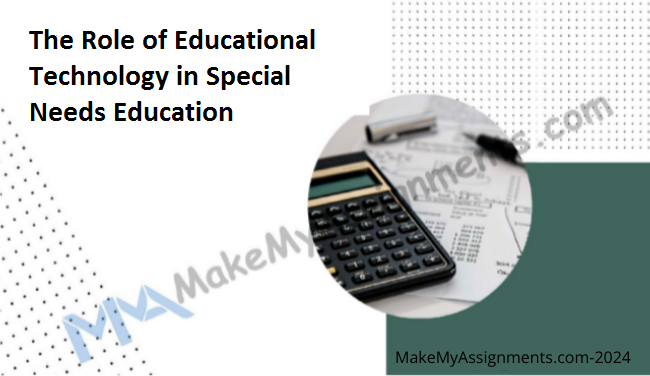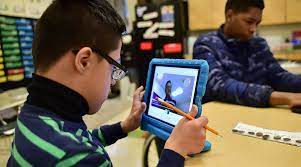
The Role of Educational Technology in Special Needs Education
In recent years, educational technology has revolutionized the way we approach teaching and learning across various domains. One area where its impact is particularly profound is in special needs education. By leveraging innovative tools and platforms, educators can cater to the diverse needs of students with disabilities, providing them with personalized learning experiences that enhance their academic, social, and emotional development. In this blog post, we will explore the significant role that educational technology plays in special needs education, examining its benefits, challenges, and promising future prospects.

Benefits of Educational Technology in Special Needs Education:
- Personalized Learning: Educational technology enables educators to create customized learning experiences tailored to the unique strengths, weaknesses, and preferences of students with special needs. Adaptive software and interactive learning platforms can adjust content and pacing based on individual progress, ensuring that each student receives instruction at their own level and in a format that suits their learning style.
- Accessibility: Technology has the power to break down barriers to learning by providing accessible resources and tools for students with disabilities. From screen readers and speech-to-text software to specialized input devices and communication apps, there is a wide range of assistive technologies available that empower students with diverse needs to participate fully in the learning process.
- Engagement and Motivation: Interactive multimedia resources, gamified learning activities, and virtual simulations can captivate the interest of students with special needs, making learning more engaging and enjoyable. By incorporating elements of fun and interactivity, educational technology can help motivate students to actively participate in lessons and develop a positive attitude towards learning.
- Independence and Self-Advocacy: Technology can foster greater independence and self-advocacy skills among students with disabilities. By providing access to digital tools for organization, time management, and self-assessment, students can take greater control of their learning journey and develop the confidence to advocate for their needs in educational settings and beyond.
- Collaboration and Communication: Online platforms and communication tools facilitate collaboration and communication among students, teachers, and parents, fostering a supportive learning community. Through virtual classrooms, discussion forums, and video conferencing, students with special needs can interact with their peers, seek assistance from teachers, and share their achievements with family members, enhancing their social and communication skills.
Challenges and Considerations:
- Access and Equity: While educational technology holds great promise for enhancing special needs education, ensuring equitable access to technology resources and infrastructure remains a significant challenge. Disparities in access to devices, internet connectivity, and training opportunities can exacerbate existing inequalities and limit the benefits of technology for marginalized students.
- Complexity and Learning Curve: Some educational technologies may have a steep learning curve for both educators and students, particularly those with complex disabilities or limited technological literacy. Teachers require ongoing professional development and support to effectively integrate technology into their instructional practices, while students may need additional time and assistance to become proficient in using assistive technologies.
- Privacy and Data Security: The use of educational technology raises concerns about privacy and data security, especially when sensitive information about students with disabilities is involved. Educators and educational technology developers must adhere to strict privacy guidelines and safeguards to protect the confidentiality of student data and ensure compliance with relevant regulations such as the Family Educational Rights and Privacy Act (FERPA).
- Digital Divide: The digital divide, characterized by disparities in access to technology between different socioeconomic and demographic groups, poses a significant barrier to leveraging educational technology for special needs education. Efforts to bridge the digital divide through initiatives such as subsidized device programs, community partnerships, and infrastructure development are essential to ensure that all students have equitable access to the benefits of educational technology.
Future Directions:
Looking ahead, the future of educational technology in special needs education holds great promise, fueled by advancements in artificial intelligence, virtual reality, and inclusive design principles. By embracing emerging technologies and collaborative approaches, educators can continue to innovate and develop new tools and strategies that address the diverse needs of students with disabilities, fostering greater inclusivity, accessibility, and educational attainment for all.
In the realm of special needs education, the integration of educational technology plays a pivotal role in catering to the diverse learning needs of students with disabilities. MakeMyAssignments, a leading online platform for academic assistance, can serve as a valuable resource for students, educators, and parents alike in harnessing the power of educational technology to enhance learning outcomes. In this section, we’ll explore how MakeMyAssignments can support special needs students through personalized assistance, accessibility features, engagement strategies, and collaborative tools.
Personalized Assistance: MakeMyAssignments offers personalized assistance to special needs students by connecting them with experienced tutors who have expertise in addressing diverse learning challenges. Whether students require additional support with understanding concepts, completing assignments, or developing study strategies, the platform provides tailored guidance to meet their individual needs. Tutors can adapt their teaching approaches to accommodate different learning styles and preferences, ensuring that students receive the support they need to succeed academically.
Accessibility Features: MakeMyAssignments is committed to promoting accessibility and inclusivity for all students, including those with disabilities. The platform offers a range of accessibility features, such as screen reader compatibility, adjustable font sizes, and alternative text descriptions for multimedia content. These features ensure that students with visual impairments, hearing impairments, or other disabilities can access educational resources and interact with tutors effectively. Additionally, MakeMyAssignments provides support for assistive technologies and accommodations, such as speech-to-text software and extended time for assignments, to facilitate a positive learning experience for special needs students.
Engagement Strategies: MakeMyAssignments employs engaging teaching strategies and interactive learning materials to capture the interest and motivation of special needs students. Tutors utilize multimedia resources, gamified activities, and real-world examples to make learning more engaging and relevant. By incorporating elements of fun and interactivity into lessons, MakeMyAssignments helps special needs students stay focused, retain information, and develop a passion for learning. Tutors also provide encouragement, positive reinforcement, and constructive feedback to boost students’ confidence and self-esteem.
Collaborative Tools: MakeMyAssignments facilitates collaboration and communication among students, tutors, and parents through its integrated platform. Special needs students can collaborate with tutors in real time via messaging, video conferencing, and virtual whiteboards to receive immediate support and guidance. Parents can also track their child’s progress, communicate with tutors, and provide input on educational goals and strategies. By fostering a collaborative learning environment, MakeMyAssignments promotes greater involvement and support from all stakeholders in the education process, leading to improved outcomes for special needs students.
MakeMyAssignments serves as a valuable ally for special needs students seeking to leverage educational technology to enhance their learning experience. Through personalized assistance, accessibility features, engagement strategies, and collaborative tools, MakeMyAssignments empowers special needs students to overcome challenges, achieve academic success, and realize their full potential. By partnering with MakeMyAssignments, students, educators, and parents can access the support and resources needed to thrive in today’s digital learning environment.





